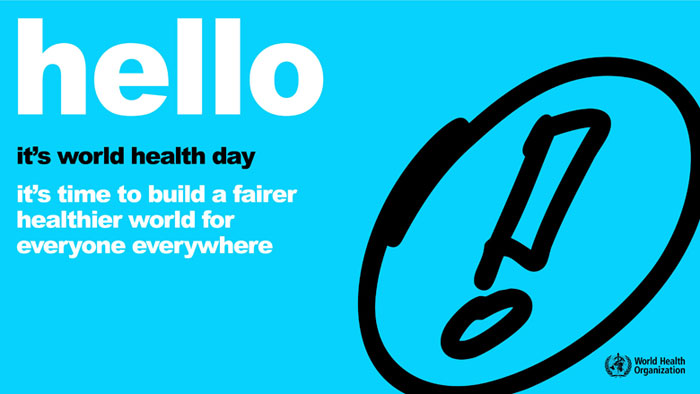World Health Day 2021

By Donald Lee, President ATD Fourth World International
Today we mark World Health Day during an ongoing COVID-19 global crisis that has claimed so many lives. We are reminded of Martin Luther King Jr. who observed that:
“Of all the forms of discrimination and inequality, injustice in health is the most shocking and inhuman because it often results in physical death.”
His words resonate in the hearts and minds of social justice activists and serve to underscore the importance of the World Health Organisation’s decision to launch a year-long campaign to build a fairer, healthier world.
This past year, the COVID-19 global pandemic has exposed and exacerbated health inequalities as well as all other types of inequalities.
As the number of cases and deaths from COVID-19 continue to rise, significant social and economic impacts of the pandemic have been harshest within communities that were already vulnerable, with less access to quality health care services and least able to withstand the negative consequences from restrictions imposed to contain the spread of the virus.
The World Bank estimates at least an extra 160 million people are at risk of being pushed into extreme income poverty.
The latest research shows that a country’s level of pre-COVID income inequality is by far the best predictor of the death rate from the coronavirus. This sobering finding was confirmed by researchers who studied variations in COVID-19 death rates in the United States and France — higher death rates tended to occur in those populated areas with higher levels pre-COVID income inequality. In Colombia, researchers found that those living in areas classified in the lower socioeconomic strata had a higher risk of dying faster from COVID-19.
For the past year, ATD Fourth World activists, supporters and Volunteer Corps members have been reaching out to some of these very low-income families in over 100 communities in 35 countries, who have been at the heart of this lived experience of such inequalities. Together with these families, they have witnessed isolation and stress during lockdowns, lack of income for food or medicines, vanishing work opportunities, unfair legal decisions, and the vast digital divide with higher risks of school dropouts. For many parents with children in alternative care, pandemic restrictions have made it extremely difficult for them to keep in touch with their children.
Of course, in the middle of the global pandemic, our immediate task should rightly be to manufacture and distribute COVID-19 vaccines to everyone in a fair and equitable manner. Pope Francis, for example, has called for the “entire international community, in a spirit of global responsibility, to commit to overcoming delays in the distribution of vaccines and to facilitate their distribution, especially in the poorest countries”. The International Committee for October 17 in its Declaration of 6 July 2020, also called for concerted international and national action to ensure that people in extreme poverty are given priority in the distribution of vaccines, as well as assistance to overcome the health, social and economic impacts of the global pandemic.
However, the current global distribution of vaccines is unjust and unacceptable. Whereas developed countries quickly secured sufficient vaccine doses for themselves, only small quantities of vaccine doses have been made available to low-income countries. It has been projected that a majority of the world’s population is unlikely to see widespread vaccine coverage until 2022 or later, prolonging suffering and hardship for everyone, especially people living in extreme poverty.
At the grassroots level, in our 100 community ATD Fourth World groups, we will continue to stay close to families and individuals who are often forgotten or even rejected. We will monitor how the vaccination campaigns reach them and how they can access adequate health care.
But beyond the shameful inequalities in vaccine availability, we must start now to address the more fundamental health and social inequalities that plague our societies. One concrete step in the right direction would be for G20 countries to commit to using the equivalent of at least a quarter of their new Special Drawing Rights (SDR) for low-income countries to support an effective vaccine rollout and a fair global recovery that benefits everyone.
On this World Health Day, we support and encourage the World Health Organisation’s call for action to eliminate health inequities as part of a year-long global campaign to bring people together to build a fairer healthier world.
Together, we can and must make it happen.

